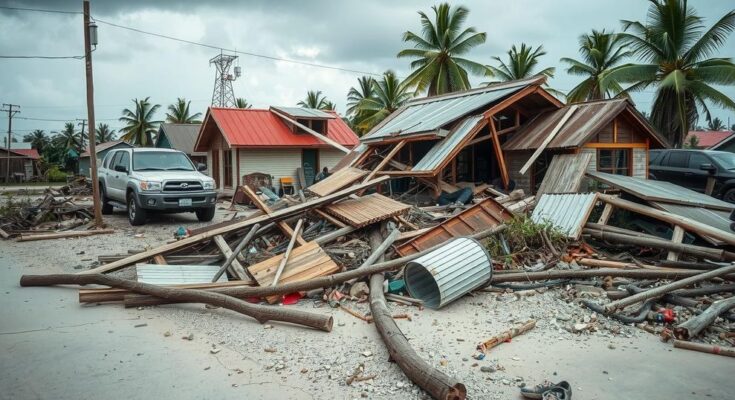Cyclone Chido has tragically killed 120 people and injured 868 in northern Mozambique. The cyclone made landfall on December 15, causing extensive damage, particularly in Cabo Delgado, Nampula, and Niassa provinces, where over 680,000 individuals were affected. Infrastructure, including homes, schools, and health facilities, was significantly damaged. Emergency shelters have been established for displaced persons, highlighting the urgent need for support and resilient planning to combat climate vulnerabilities.
Cyclone Chido, a devastating tropical cyclone that struck northern Mozambique, has resulted in a tragic death toll of 120 individuals, along with 868 injuries and over 680,000 people adversely affected. The cyclone made landfall on December 15, unleashing torrential rains and fierce storms primarily in the regions of Cabo Delgado, Nampula, and Niassa. The National Institute for Disaster Risk Management and Reduction (INGD) reported that these areas suffered extensive destruction, with approximately 123,000 families impacted, leading to the damage or total loss of more than 150,000 homes, in addition to significant damage to schools and health facilities.
In the wake of this calamity, the Mozambican government has set up two emergency shelters that are currently housing 1,349 displaced individuals. The cyclone’s aftermath has had a profound effect on the education sector, with nearly 110,000 students affected and numerous schools severely damaged. The INGD’s social media update underscored the critical need for resilient infrastructure, stating that the cyclone “once again highlights the vulnerability of social infrastructure to climate change and the need for resilient planning to mitigate future impacts.”
Cyclone Chido originated over the southwestern Indian Ocean on December 5 and initially wreaked havoc in Mayotte, a French overseas territory, before making landfall in Mozambique. The storm emphasizes the broader challenges posed by increasingly severe weather patterns attributed to climate change. Authorities and international humanitarian organizations are urgently seeking assistance to address the immediate needs of those affected by this disaster.
The occurrence of Cyclone Chido is a stark reminder of the growing vulnerability of nations to climate-related disasters. Mozambique, situated in a region prone to tropical storms, faces challenges in managing the impacts of such severe weather events. The recent statistics from Mozambique’s national disaster relief agency illustrate the extensive human and infrastructural toll associated with Cyclone Chido, further accentuating the importance of disaster preparedness and response strategies to safeguard communities against future cyclones and climate-induced crises.
In conclusion, Cyclone Chido has left a devastating mark on northern Mozambique, with significant loss of life and widespread destruction affecting thousands of families. As the government and humanitarian organizations work tirelessly to provide relief and support for the afflicted communities, it is imperative to acknowledge the pressing need for robust infrastructure and climate resilience planning to mitigate the impacts of similar disasters in the future. The situation remains critical, requiring continued attention and resources to aid recovery efforts.
Original Source: english.mathrubhumi.com




